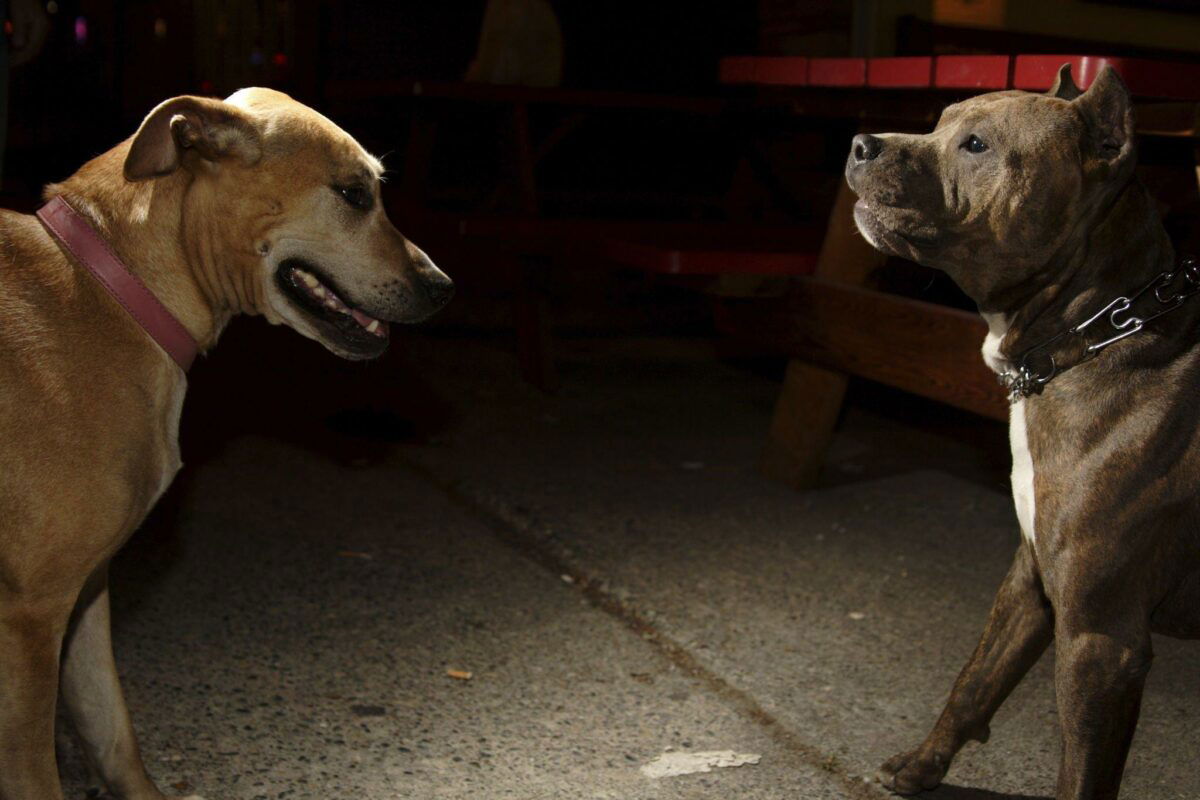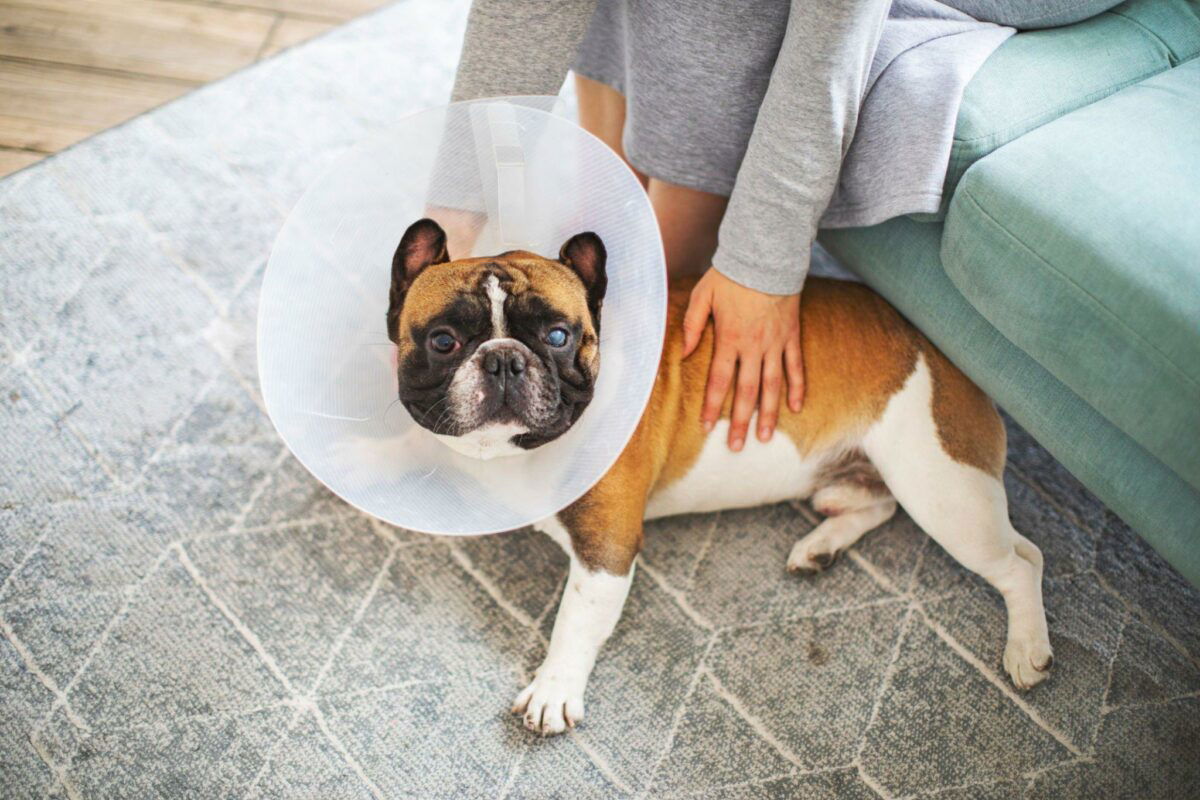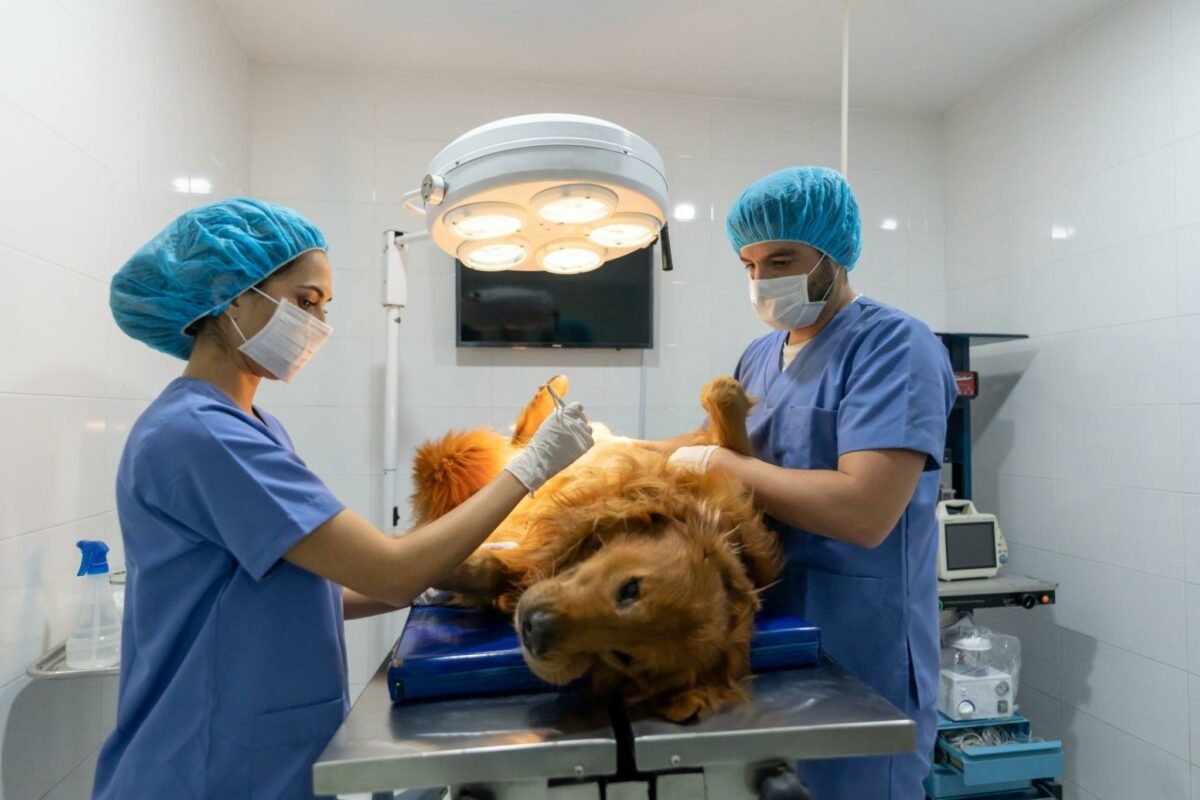We're an affiliate
We hope you love the products we recommend! Just so you know, we may collect a share of sales or other compensation from the links on this page at no additional cost to you. Thank you if you use our links, we really appreciate it!
Is your male dog suddenly mounting other dogs? Are you worried about your female dog’s behavior during the reproductive cycle? Are these the telling signs your dog needs to be neutered?
It’s not rare for such issues to occur in sexually intact canines, and for some pet parents, these signs are somehow puzzling and hard to define.
You must have heard about neutering or spaying, and as a responsible dog owner, it’s on your part to improve your dog’s health, behavior, and well-being.
Continue reading this post as we break down some common signs from your intact dog that might point to the need for altering their reproductive organs.
We will also highlight the benefits of neutering dogs and the common side effects unneutered dogs are likely to come across.
What Is Dog Neutering?
Neutering is the surgical removal of the reproductive organs in dogs under general anesthesia done by a licensed veterinarian.
The main goal of performing a neutering surgery in dogs is to make them unable to produce sexual hormones.

In male dogs, neutering involves the safe removal of one or both testicles, and the procedure is also known as castration.
A female dog is neutered through the removal of the ovaries or uterus through a surgical procedure known as spaying.
Neutering should not be viewed as a quick fix for unwanted behavior in dogs.
Even though your dog’s behavior may change post-neutering, we recommend relying on advice from your vet on how and when to book a surgery date for your canine friend.
6 Signs Your Dog Needs to Be Neutered
As a responsible pet parent, you need to pay close attention to your dog’s behavior to point out some revealing signs that they need to be neutered.
1. Escaping and Roaming
Sexually intact male dogs will do everything possible to escape and roam around if they perceive a nearby female on heat.
It is estimated that male dogs can scent an unspayed female dog on heat up to three miles away!
This is because female dogs looking for partners may release a particular pheromone whose scent travels fast through the air and can be detected miles away by unaltered male pups.
Your dog may try to make that risky jump over the fence just to attend to the female companion no matter how hard you try to stop them.
This behavior is caused by the increased testosterone level in male dogs.

Allowing dogs to mate and reproduce without measure is problematic in many ways.
First, it may lead to unwanted pregnancies and unplanned litter which may end up in the streets or rescue centers.
The other risk factor is that your male dog may get into an accident when roaming around busy streets in response to a female dog on heat.
2. Humping or mounting
Humping is a perfectly normal behavior in dogs, and they may do it for various reasons including overexcitement, playfulness, or responding to a female on heat.
Unneutered dogs may begin to hump even in public places, the moment they notice a nearby female on heat.
It’s important to note that male dogs don’t have specific heat cycles like their female companions.
They will always be ready to mate with a female on a reproductive cycle, and they can mimic the act by humping on other dogs or mounting on toys and people.
Some pet parents may feel embarrassed when their male pups hump on other dogs in the park, toys, or even stroking the air, and this behavior should tell you it’s time to get them neutered.
Unsolicited humps on other dogs may land your furry friend into trouble and may even cause unwanted pregnancies or poor cross breading.
By removing your dog’s testicles, they won’t get hormonal triggers to respond to females on heat, thereby reducing humping significantly.
3. Enlargement of the prostate glands
The prostate glands in dogs are responsible for the production of seminal fluids which play a vital role in fertilizing female ovaries.
The enlargement of the prostate glands is a condition medically known as Benign Prostatic Hyperplasia (BHP) which is commonly seen in senior males aged five and above.
Some of the signs that your male dog has enlarged prostate glands include painful urination, frequent urination, discomfort walking, constipation, traces of blood in urine, and bloody discharge.
You can prevent your dog from advancing into conditions such as prostate gland enlargement by safely removing their testicles before they get elderly.
4. Heat cycle in female dogs
Most unspayed female dogs will generally experience two heat cycles throughout the year, a period in which they secrete certain pheromones to show their readiness to mate.
During this reproductive cycle, your female dog will show changes in behavior such as being restless, roaming around, and excessive mounting.
Female dogs in heat may often become more affectionate and seek attention from nearby male partners. It’s also common for them to urinate excessively to leave a scent trail for potential mates.
Some of the physical signs of readiness to mate in female pups include; swollen vulva, vaginal discharge, excessive licking of the back end, and bleeding from the vulva.
You can also know if your dog is in heat if male dogs are all over chasing after her with advancements such as grooming being protective.
5. Urine Marking
Urine marking is a common dog behavior. They do this by peeing on vertical surfaces in specific areas to possess the territory.
There’s nothing wrong with dogs who mark specific outdoor areas with their urine, but this may become a problem if they do it inside the house.
Indoor urine marking is commonly seen within households with two or more unneutered male dogs living together.
If your housetrained dog is suddenly spraying your house items with urine, then this can be a good sign that they need to get neutered.
Researchers have shown that dog neutering can reduce the frequency of urine marking behavior by up to 80% in male dogs regardless of the age and time of surgery.
It has been postulated that neutered male dogs tend to mark less because they don’t need to compete with other dogs for a female’s attention.
6. Aggressive behavior
A build-up of testosterone hormone in male dogs can make them dominant and aggressive to other pets without cause.
Unaltered male dogs are more likely to become very protective of their personal spaces, and they can easily pick fights with other dogs.
High testosterone in dogs also makes them get very competitive with other male dogs because of their need for attention from potential females.

Research done by Evan MacLean of the University of Arizona concluded that testosterone is not the only hormone that may be contributing to canine aggression.
Both oxytocin and vasopressin hormones can also tilt your dog’s moods to the hostile side.
Your dog’s sudden aggression and dominant behavior may be a telling sign that they need an appointment with the vet for a neutering surgery.
Benefits of Neutering Dogs
Even though some pet parents believe that neutering surgery can be painful or cruel to dogs, this surgical procedure comes with a lot of benefits.
1. Controls the population of dogs
Neutering dogs helps to reduce the chances of getting unplanned litters and advancing the overpopulation of dogs in the community.
It has been estimated that up to 3.1 million dogs in the US will somehow find their way into animal shelters every year, a number that overwhelms most animal welfare organizations.
By controlling the reproduction of puppies, you are reducing the chances of some of them ending up in the streets as stray animals or in overcrowded shelters.
2. Improved canine behavior
The other noteworthy benefit of neutering your dog is that it helps in changing their behavior to make them better and calm.
Non-neutered male dogs can sometimes be a pain to deal with in the house because they tend to show negative behavior associated with the buildup of testosterone hormones.
Fixed male dogs on the other hand will experience a decline in the testosterone hormone, and they are more likely to be calm and highly focused.
This procedure is often associated with a reduction of unwanted behaviors in dogs such as aggression, excessive urine marking, roaming, and mounting behaviors.
Spayed female dogs may also experience a decrease in certain behavioral issues associated with their heat cycles, such as restlessness and excessive vocalization.
3. Health benefits
Neutering male dogs lowers their risk of developing testicular cancer and decreases the chance of certain prostate issues that can lead to discomfort and potential health complications.
Canine testicular tumors are the second most prevalent cancer affecting sexually intact male dogs.
Spayed female dogs are also at a lower risk of developing mammary tumors, uterine infections, and other treatable diseases.
For the most part, neutered dogs have been shown to live a longer and happier life, which is something that every pet parent wants for their beloved furry friends.
The chances of neutered dogs getting infectious diseases from viruses like parvovirus and distemper are also significantly reduced in neutered dogs.
Once your male dog gets ‘the big snip’ they are less likely to roam around because they don’t feel the urge to chase after females on heat. This reduces their chances of accidents and getting into fights with other dogs.
4. Improves social interactions in dogs
Sexually intact male dogs are more likely to show inter-male dominance and reduced social life when living together in one home.
Neutering your male dog can help them build better social interactions with their fellow male canines and reduce their likelihood of picking up fights in every situation.
Dogs with good social lives are likely to get along with other pets, both at home and out in the parks. This comes as a reward due to the positive experience of enjoying your dog’s company.
What Are the Side Effects of Not Getting Dogs Neutered?
Neglecting to neuter your dog may come with certain side effects which may affect your dog’s quality of life and your pet-parenting journey. They include;
1. Unwanted pregnancies
One of the biggest concerns about not spaying your female dog is having to deal with unwanted pregnancies and unplanned puppies.
The normal litter size in dogs can range anywhere from one puppy to upwards of twelve puppies. On average, most dogs will have about 5 to 6 puppies in a litter.
Having to deal with such a high number of surprise visitors can be overwhelming for most dog owners and it also comes with a high cost of nurturing them.
Unexpected litters can lead to an overpopulation of dogs which contributes to the already pressing issue of stray and abandoned animals in society.
It may not be easy to find suitable homes willing to adopt all your puppies, and this may result in the young canines ending up on the streets or in overcrowded shelters.
2. Bad behaviors
The other side effect of not altering your dog’s reproductive organs is that you may have to deal with unwanted behavior such as dominance, aggression, roaming, or even biting.
Failing to neuter your male dog may result in a constant build-up of testosterone hormones whose side effects are manifested in aggressive tendencies.
Unneutered male dogs are more likely to pick up a fight against each other over dominance issues or when tussling for a female’s attention.
Male dogs who fight each other are likely to get injured during the scuffle and this may lead to secondary issues such as infections.
Dealing with sexually intact male dogs can particularly be challenging to most dog owners, who normally end up taking their canine friends to animal behaviorists, achieving little or no success.
3. Excessive urine marking
Dogs with intact reproductive organs are more likely to claim territory by spraying certain spaces with excessive urine.
Neutered male dogs are less likely to mark areas with their urine because they don’t have the inherent urge to shout their presence to other dogs.
4. Health risks
Unneutered male dogs are at a high risk of developing serious preventable illnesses such as testicular cancers and prostate issues.
Sexually intact females on the other hand are at risk of developing mammary tumors or uterine infections such as pyometra among other issues, during the heat cycle.
What Is the Best Age to Neuter a Dog?
1. Male dogs
The best time to neuter your male pooch will vary depending on their breed and size. This is because different dog breeds and sizes achieve full maturity at different ages.
Toy breed and small dogs can be neutered between six and nine months because they sexually mature faster than the others.
Large breeds and giant dogs can be neutered anywhere between 16 and 18 months based on their sexual maturity.
2. Female dogs
Based on the maturity level of your female dog, you should only spay them before they reach their first heat cycle which generally occurs between seven to ten months of age for most dogs.
Is Neutering Painful for Dogs?
Contrary to what some people believe, neutering is NOT painful during the actual surgery because it is done under general anesthesia, which makes the patient unconscious and numb.
What most pet parents are concerned with is the recovery phase after surgery.
Like any other surgical treatment, your sexually-altered dog may experience some levels of discomfort when the anesthesia fades out.
Some dogs may feel slight pain, swelling, or redness around the incision area during the healing process.

To help manage the condition after surgery, your vet will prescribe pain-relieving medication to help your furry friend feel better.
It is recommended to look after your dog during the recovery period and avoid taking them out before fully healing.
Your vet will also advise you on when to walk your dog after neutering during the post-surgery clinical visits.
Frequently Asked Questions (FAQs)
1. When is it too late to neuter a dog?
It is never too late to book an appointment with your vet for a dog-neutering surgery.
Even though it is generally recommended to neuter your family pup immediately after they mature sexually, there’s no age limit for doing this surgery.
Some circumstances such as underlying health conditions may derail your dog’s timing for a neutering surgery, but it can still be performed once cleared by the vet.
2. Does neutering a dog help with dominance?
Yes! It is widely accepted that neutering a male dog can help calm their boisterous, over-excitable, and dominant nature during adolescence stage.
Male dogs are likely to engage in supremacy battles with other males because of the consistent build-up of testosterone hormones.
Neutered dogs are less likely to show dominant behaviors because of the reduced levels of the testosterone hormone, which largely originates from the testicles.
It’s important to note that altering your dog’s reproductive organs may not be a guaranteed solution to cure unwanted behavior.
Proper training, early socialization, and behavior modification will equally play a large part in reinforcing positive behavior in dogs.
3. Does neutering a male dog calm them down?
Whereas neutering may reduce testosterone-driven behavior such as inter-male aggression, roaming, and mounting behaviors, it may not completely help to calm down a male dog.
Neutered male dogs may settle down and remain focused on other tasks, but the removal of the testicles may not have an effect on the dog’s general temperament and personality.
Such personalities may be driven by previous training experience, socialization, and the different energy levels in dogs.
4. Will my dog gain weight after being neutered?
Your dog may be at risk of gaining weight post-neutering if you maintain the same diet even with reduced activity from the dog. Some dogs may show a significant increase in appetite.
Neutered dogs may also experience decreased energy levels, which may affect their physical activity and make them add some pounds.
Unhealthy weight gain is mostly seen during the first two years after surgery when the dog adjusts to the new metabolism and way of life.
5. Are there any long-term health risks associated with neutering?
Despite the numerous benefits of neutering your dog, it has been reported that some dogs may get exposed to long-term risks based on several factors.
The most prevalent problem is the risk of gaining excess weight leading to obesity, which can then open up the possibilities of other canine illnesses.
Neutering eliminates the risks of reproductive organ cancer, but some dogs have been reported to have a higher likelihood of developing other cancers.
It’s always important to rely on qualified advice from the vet concerning your dog’s individual risk factors before, during, and after a neuter.
Conclusion
Trying to escape, roaming, or showing aggressive and dominant behaviors around other male dogs, are some of the common signs your dog needs to be neutered.
We highly recommend picking an appointment with your vet to discuss the possibility of neutering once your dog shows these signs, or if you’re concerned about their behavior.
Altering your dog’s sexual organs comes with lots of advantages including the prevention of unwanted pregnancies and improvement of the overall quality of life.
Laura is the founder of Furs'n'Paws. She is a also a pet writer and expert with more than 20 years of experience of working with dogs and cats. She developed a very strong love for animals at a young age. Her passion led her to establish a thriving pet sitting and dog walking business in Dubai. As an expert in pet training, behavior, and nutrition, Laura is committed to helping pet owners and pet lovers by offering high-quality information on a wide range of topics.



No responses yet